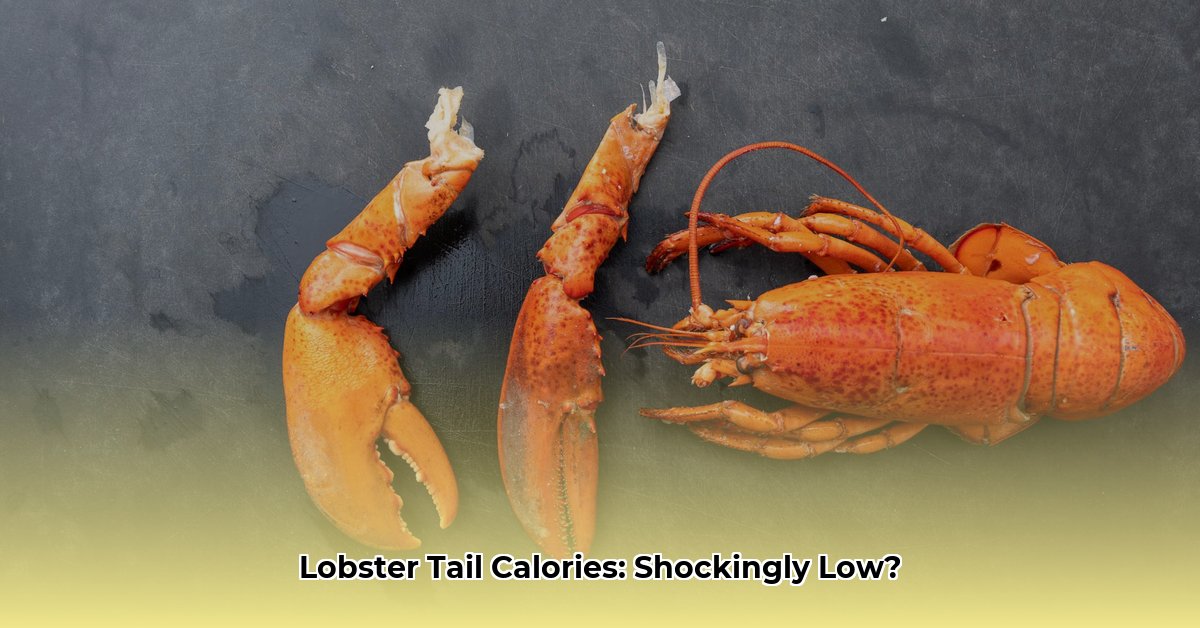This guide provides accurate calorie and nutritional information for lobster tail, helping you make informed choices about incorporating this delicacy into a balanced diet.
Understanding Lobster Tail Calories
Want to enjoy lobster tail without derailing your diet? It’s crucial to understand that calorie counts vary significantly based on serving size and preparation. This guide clarifies these factors and offers practical tips for enjoying lobster in a healthy way.
Serving Size Matters
Forget the vague “one lobster tail” measurement. Lobster tails range dramatically in size. A small tail might be 3 ounces (about the size of a deck of cards), while larger ones can easily exceed 6 ounces. For accurate calorie calculations, always weigh your lobster tail using a kitchen scale.
Calorie Content for Steamed/Boiled Lobster
Steaming or boiling are the leanest cooking methods. Here’s a general calorie guide:
| Serving Size | Calories (Approximate) |
|---|---|
| 3 oz (85g) | 80-90 |
| 4 oz (113g) | 105-125 |
| 100g | 115-125 |
Nutritional Breakdown (per 3oz Serving)
Lobster offers more than just delicious flavor; it’s a nutritional powerhouse:
| Nutrient | Amount (Approximate) |
|---|---|
| Protein | 20-25g |
| Total Fat | 1-2g |
| Saturated Fat | <1g |
| Cholesterol | 60-80mg |
| Sodium | 150-250mg |
| Carbohydrates | ~0g |
While lobster contains cholesterol, current research suggests dietary cholesterol may have a less significant impact on blood cholesterol than previously thought. Still, moderation is likely advisable, especially for individuals with specific health concerns. Consult a doctor or registered dietitian for personalized advice.
Cooking Methods and Calorie Impact
While steaming and boiling keep calories low, other methods significantly increase the total count.
Added Calories From Common Ingredients
| Ingredient | Calories (Approximate) |
|---|---|
| Melted Butter (1 tbsp) | 100 |
| Clarified Butter (1 tbsp) | 120 |
| Garlic Butter Sauce (1 tbsp) | 70-110 (depending on recipe) |
Adding rich sauces or buttery breading adds a substantial amount of fat and calories. For a healthier approach, enhance flavor with herbs, spices, lemon juice, or a small amount of olive oil.
Lobster vs. Other Protein Sources (3oz Serving)
| Food Item | Calories (Approximate) |
|---|---|
| Lobster Tail | 80-90 |
| Shrimp | 85 |
| Cod | 70-80 |
| Chicken Breast | 165 |
| Salmon | 175 |
| Sirloin Steak | 250 |
Lobster is a leaner protein choice compared to many cuts of beef and even chicken breast.
Glycemic Index and Dietary Considerations
Lobster has a low glycemic index (GI), making it suitable for low-GI diets like keto and paleo. Its minimal carbohydrate content won’t cause a significant blood sugar spike. However, remember that side dishes and cooking methods can affect the overall GI of your meal.
Lobster Tail FAQs
Is lobster tail healthy?
Yes, lobster tail can be a part of a healthy diet. It’s rich in protein and low in fat and carbohydrates. However, cooking methods and portion sizes significantly influence its health impact.
How can I cook lobster tail without adding many calories?
Steaming, boiling, grilling, or baking are your best bets. Season with herbs, spices, lemon, or a drizzle of olive oil instead of butter or heavy sauces.
Is lobster sustainable?
The sustainability of lobster depends on the source and fishing practices. Look for certifications like the Marine Stewardship Council (MSC) label, which indicates sustainable fishing practices. You can also research specific fisheries and their commitment to sustainability.
Are there any health concerns with eating lobster?
Some individuals are allergic to shellfish, including lobster. Also, as mentioned, lobster does contain cholesterol, so moderation is recommended for those with cholesterol concerns. Consult your doctor for personalized advice.
[!NOTE]
This information is for educational purposes only and does not constitute medical advice. Consult with a healthcare professional or registered dietitian for personalized dietary guidance.
- Tupperware with Dividers Makes Entertaining Easy and Organized - March 5, 2026
- Steel Containers for Food Offer Versatile and Fresh Everyday Storage - March 4, 2026
- Metal Meal Prep Containers Are a Lasting Investment for Everyday Use - March 3, 2026










